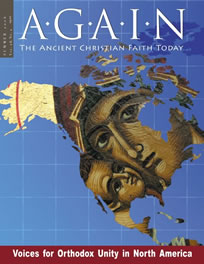August 1: Procession of the Honorable Wood of the Life-Giving Cross
In the Russian Church this Feast is combined also with the remembrance of the Baptism of Rus, on August 1, 988. In the "Account of the Order of Services in the Holy, Catholic and Apostolic Great Church of the Dormition," compiled in 1627 by order of Patriarch Philaret of Moscow and All Rus, there is the following explanation of the Feast: "On the day of the Procession of the Venerable Cross there is a church procession for the sanctification of water and for the enlightenment of the people, throughout all the towns and places." Knowledge of the day of the actual Baptism of Rus was preserved in the Chronicles of the sixteenth century: "The Baptism of the Great Prince Vladimir of Kiev and all Rus was on August 1." In the present practice of the Russian Church, the Lesser Sanctification of Water on August 1 is done either before or after Liturgy. Because of the Blessing of Water, this first Feast of the Savior in August is sometimes called 'Savior of the Water." There may also be a Blessing of New Honey today, which is why the Feast is also called "Savior of the Honey." From this day the newly gathered honey is blessed and tasted.
(From the website of the Orthodox Church in America)




